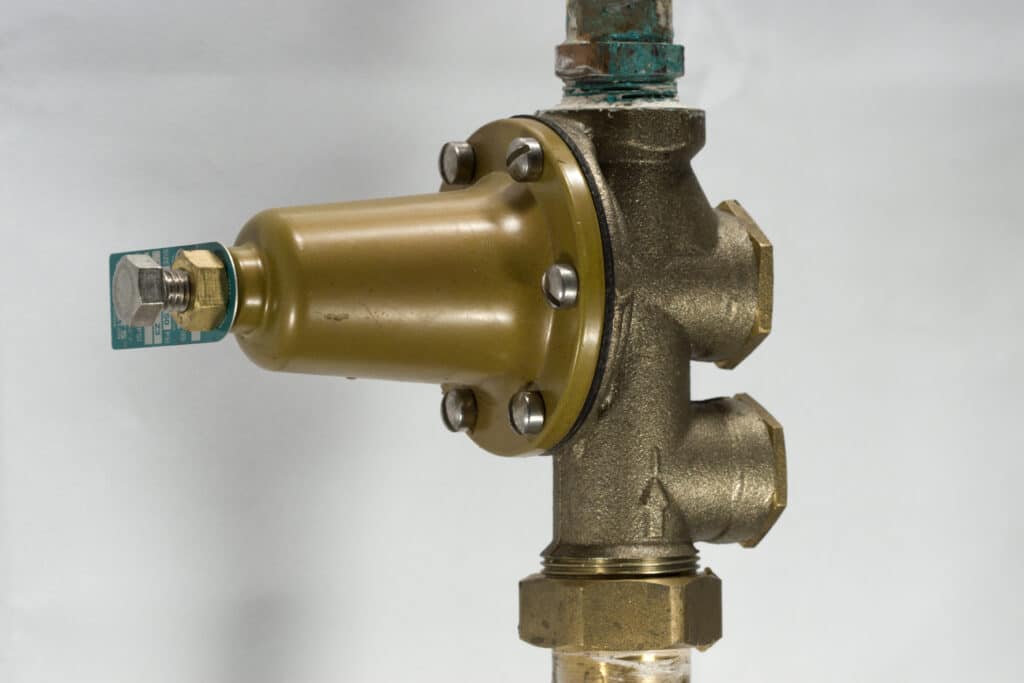
Pros and Cons of Water Pressure Regulators
Water pressure regulators keep water pressure steady, which helps protect your pipes and makes your appliances last longer. They’re key in cutting down on water waste and keeping delicate equipment safe by holding the pressure even. While there are costs for setting them up and keeping them in good shape, the benefits can save you money and make systems run better over time.
Understanding Water Pressure Regulators
Ever wonder why water pressure regulators are vital for your plumbing?
These small devices are key to protecting your home from plumbing issues.
Simply put, these regulators are valves that set the water pressure to a safe level.
This adjustment helps avoid damage to plumbing and keeps water flow steady.
In Conway, SC, the importance of these regulators is crucial to ensure safe water pressure levels in homes, safeguarding both equipment and infrastructure.
It’s not just a choice; it’s a necessity.
Opting for a two-stage pressure regulator can be beneficial over single-stage types.
They better handle pressure drops, maintaining stable outlet pressure and preventing problems like unnecessary fluctuations.
Though installing a regulator might seem like an investment at first, it helps prolong the life of your plumbing system and reduces water waste.
Make sure it’s installed and maintained properly for peace of mind and efficiency at home.
Why Use Water Pressure Regulators
Water Pressure Regulators keep your home’s plumbing safe and come with many perks.
They protect pipes and fixtures from damage caused by high pressure, which can lead to leaks or bursts.
By keeping the water pressure steady, they help cut down on water waste, benefiting the planet.
Another big plus is that they make appliances last longer.
Things like washing machines and dishwashers work better and have a longer life when the water pressure is constant.
This stops the wear and tear from fluctuating pressures.
So, residents in Conway, SC, using Benjamin Franklin Plumbing of Myrtle Beach, can worry less about their home appliances.
In the end, installing a regulator for water pressure helps your plumbing function smoothly, reduces unexpected repairs, and supports smart water use—all while making your home more comfy and efficient.
Downsides of Water Pressure Regulators
Water pressure regulators have their perks, but there are some cons too.
First, they can require professional installation to ensure they function correctly, making it a necessary consideration for most homeowners.
Then, there’s the maintenance.
These gadgets, though tough, need some care.
You have to check them now and then to spot any wear or problems early, avoiding big repair bills later.
In places like Conway, SC, these devices can have a hard time due to different water quality and rules.
If you have hard water, that can wear them out faster, meaning you’ll need to check and fix them more often.
But still, the benefits, like less water damage and longer-lasting appliances, usually beat these small hassles.
Overall, you must weigh the initial setup and upkeep against the big savings you’ll get in preventing water waste and damage.
If you care about making your home more efficient and keeping it safe, a water pressure regulator is a smart pick.
Homeowners should talk to pros like Benjamin Franklin Plumbing of Myrtle Beach to find the best solution for their needs.
Components of a Water Pressure Regulator
Understanding the components of water pressure regulators helps you see how these gadgets keep water pressure steady and safe for plumbing.
Such a regulator is basically a valve that tweaks water pressure down to a set level, protecting delicate gear from damage due to pressure changes.
The main parts are the diaphragm, spring, and valve seat.
The diaphragm is a flexible sheet that reacts to water pressure changes.
The spring pushes against the diaphragm to keep the set pressure.
The valve seat is the spot where flow control happens as the diaphragm adjusts, deciding how much water moves through the regulator.
When these parts work as a team, they help maintain consistent water flow, which is key to protecting plumbing in places like factories, offices, and homes.
This shows why regulators are so important for making plumbing last, especially where water pressure can fluctuate significantly.
For folks in Conway, SC, knowing about these components underscores the importance of having a professional like Benjamin Franklin Plumbing of Myrtle Beach, SC install and maintain your regulator.
A professional setup ensures efficiency and reduces the risk of sudden large pressure changes that can lead to costly repairs.
How Water Pressure Regulators Work

Water pressure regulators are essential for smoothing your plumbing system.
They operate through a basic mechanism involving a diaphragm and a spring.
When high-pressure water enters, it presses against the diaphragm, while the spring’s resistance reduces the pressure to a safe, consistent level suitable for household use.
These devices adjust to changes in water flow, ensuring pressure consistency and protecting pipes and appliances from potential damage.
Although the control valve allows adjustment of output pressure, it’s wise to let professionals in Conway, SC, such as Benjamin Franklin Plumbing of Myrtle Beach, SC, handle the installation to prevent complications.
Properly installed, pressure regulators provide a level of stability akin to what’s used in gas systems.
They safeguard your plumbing by preventing leaks and maintaining the efficient function of appliances, making them crucial for a dependable plumbing setup.
Checking Water Pressure in Your Home
Checking your home water pressure is key to keeping your plumbing in good shape.
Normal water pressure is usually between 40-60 psi.
If the pressure goes above this, it’s called high water pressure, and it puts stress on your pipes and appliances.
If not fixed, this can cause leaks, bursts, and big repair bills.
How do you know if you need a regulator?
There are clear signs you might need a water pressure regulator.
Dripping faucets, noisy pipes, and shortened appliance life suggest high pressure.
You might also see too much water flow in your shower or faucets, hinting at pressure problems.
For folks in Conway, SC, it’s important to watch for these signs and consult a professional to test the pressure now and then.
Professionals, like those at Benjamin Franklin Plumbing of Myrtle Beach, SC, can provide an accurate reading and determine if you need one.
This helps protect your plumbing and save water, which is good for both your wallet and the planet.
When You Might Need Water Pressure Regulators
In many homes, water pressure regulators can be key to keeping your plumbing smooth.
One sign you might need one is if your water pressure changes a lot—sometimes it’s loud and strong, other times it’s soft.
A regulator might be what your home needs.
High water pressure doesn’t just make your showers intense; it can cause leaks and put stress on your appliances like dishwashers and washing machines.
For families with uneven water flow, a pressure regulator is important.
It keeps the water pressure steady and manageable.
Homes using city water systems, especially in growing places like Conway, SC, can face challenges with quickly changing or high water pressure due to fluctuations in the area.
Here, a two-stage regulator can help keep things calm.
Also, if your plumbing bangs and makes noise due to ‘water hammer’ sounds, a regulator can help by reducing those noises.
Hiring a professional, like Benjamin Franklin Plumbing of Myrtle Beach, SC, can provide a solution that fits your water needs and your home perfectly.
Identifying Your Water Pressure Regulators
Locating a Water Pressure Regulator at home isn’t too hard.
Look near the main water shut-off valve, usually in the basement or utility room.
These devices are small and bell-shaped with a brass body.
Being aware of this part can help you avoid plumbing issues.
Look for a threaded knob or bolt on top to adjust the pressure.
Some have gauges showing pressure levels.
If you hear hissing sounds near it, it might need a check.
If your home’s water pressure fluctuates a lot or your appliances don’t work well, your regulator may require professional attention.
In Conway, SC, it’s wise to monitor these components to keep your plumbing running smoothly.
If something doesn’t seem right, call Benjamin Franklin Plumbing of Myrtle Beach, SC.
They can maintain your plumbing system, protecting your home.
Lifespan of Water Pressure Regulators
Devices managing water flow, commonly known as water pressure regulators, often overlooked in your plumbing system, usually last about 10 to 15 years.
This can change based on factors like water quality, system pressure, and how often you use it.
In places like Conway, SC, where water conditions vary, it’s important to watch for signs of wear.
Hard water can cause sediment buildup, which might shorten the regulator’s life.
Routine checkups are key to making sure your regulator lasts as long as it should.
Regular inspections can catch small problems before they turn into big, costly repairs.
Parts like seals and springs wear out over time, affecting how well the flow management device works.
Also, avoiding big swings in pressure can help your regulator last longer.
To make sure your water pressure regulators last as long as possible, think about getting advice from experts like Benjamin Franklin Plumbing of Myrtle Beach, SC.
They offer guidance and services tailored to your needs.
Understanding these systems now can help you avoid future plumbing issues and surprise costs.
Indicators to Replace Your Water Pressure Regulator
Water pressure regulators maintain a steady flow in your home, but they can wear out.
Watch for signs like changing water pressure, leaks, or odd sounds near your pipes.
These indicate potential regulator issues.
Residents in Conway, SC, often encounter these problems due to shifts in the area’s water pressure.
You might also notice banging sounds in the pipes or dripping faucets, even when tightly closed.
This isn’t just annoying; it could point to a malfunctioning water pressure regulator.
If appliances like dishwashers or washing machines seem under strain, inadequate pressure might be the cause.
It’s wise to consult a professional to assess the situation.
A water pressure regulator typically lasts about 10 to 15 years, but this can vary with water quality and usage.
If yours is nearing its lifespan, having it inspected by a professional is advisable.
Replacing a faulty regulator early can prevent future headaches and expensive water damage.
Get A Pro to Install Water Pressure Regulators in Conway, SC
If you want to keep your plumbing in Conway in top shape, it’s smart to have a pro handle your water pressure regulators.
Hiring experts like Benjamin Franklin Plumbing of Myrtle Beach, SC means protecting your home from plumbing issues.
They know the right way to install the regulator, so you avoid problems like uneven water pressure or leaks.
During the installation, pros will check your setup, fit the new regulator, and test everything to make sure it works perfectly.
This not only makes your plumbing work better but also helps your water-using appliances last longer.
Choosing pro installation cuts down the chance of mistakes that could lead to expensive fixes later.
Having trusted pros do the job gives you peace, knowing your system meets local rules.
Plus, keeping the right pressure on your pipes saves your gear, which is key if you’re after reliability in Conway.
Let the experts handle the hard parts and enjoy a smooth, long-lasting plumbing system.
When to Hire a Pro for Plumbing Needs
Thinking about installing water pressure regulators by yourself or getting a pro to do it?
Let’s weigh the options.
While DIY might seem appealing for learning more about your home’s plumbing and can be a satisfying project if you like working with your hands, it’s important to recognize the potential risks.
There are some downsides to DIY plumbing.
Mistakes can lead to costly repairs and big problems if steps are missed.
Plumbing often requires more than just basic skills and can be complex.
Getting a pro to install water pressure regulators, especially if it’s tricky, ensures safety and efficiency.
Pros have the right tools and skills to do it right and can spot issues early.
Hiring experts, like the team at Benjamin Franklin Plumbing of Myrtle Beach, SC, means your system will last longer and work better.
You save time, avoid hassle, and skip future costs.
Choosing a pro can keep your Conway home in great shape.
Buying water pressure regulators can save you money later.
The initial investment might seem high, including the equipment and paying someone to install it.
But soon, the regulator saves you money in ways you might not expect.
It stops too much pressure, which can save your plumbing from pricey fixes and make your home appliances last longer.
This means you’ll face fewer surprise bills.
Benjamin Franklin Plumbing of Myrtle Beach offers expert help to make sure your regulator is set up right the first time.
Picking a pro in Conway, SC, means it’s done well, and you’ll feel good knowing your system runs just right.
Over time, pressure control devices cut down water use and save on bills.
Less wasted water means lower utility bills, which helps your wallet!
Plus, since appliances last longer, you spend less on replacements and upkeep.
Though maintenance is needed, it’s easy and doesn’t happen too often.
Making sure the regulator works well helps you save money over the long run.
By getting good installation and regular check-ups, you have a reliable way to avoid surprise costs.
So, though the initial investment might feel high, it’s a smart spend for your home’s efficiency and care.
FAQs
What are water pressure regulators?
These devices lower the water pressure to a set level, keeping the pressure steady and protecting plumbing parts.
How do I know if I need a water pressure regulator in Conway, SC?
If your water pressure is too high, you have frequent leaks, or your pipes bang, it’s a good idea to talk to Benjamin Franklin Plumbing of Myrtle Beach, SC to see if you need one.
How often should such a regulator be replaced?
They usually last 5 to 15 years. But water quality, usage, and maintenance can change this. Regular checks can help avoid early problems.
What are the benefits of installing water pressure regulators?
They protect your plumbing, save water, and help your appliances last longer by keeping water pressure stable.
Can I install a pressure regulator myself?
While it might seem straightforward, it’s safer and quicker to have a pro from Benjamin Franklin Plumbing of Myrtle Beach, SC do it to ensure proper installation and avoid potential issues.

 843.213.6611
843.213.6611